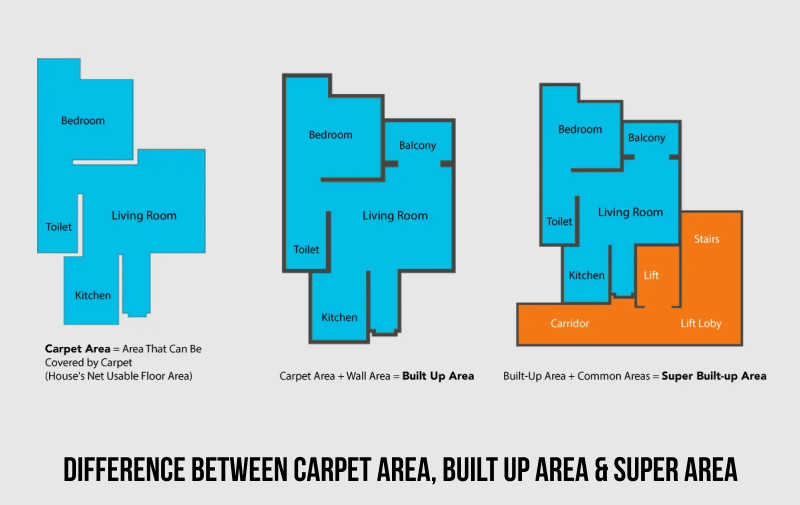What are the important documents for converting a leasehold property to freehold?
 In a freehold property, the owner can enjoy the absolute ownership but in a leasehold property, the holder of property is a lessee and the owner of the property is a lessor who leased out the property for a certain period of time and after expiry of the lease term the lessee has to vacate the property or premises leased. The conversion of a leasehold property to freehold property can be done only with purchase of the property.
In a freehold property, the owner can enjoy the absolute ownership but in a leasehold property, the holder of property is a lessee and the owner of the property is a lessor who leased out the property for a certain period of time and after expiry of the lease term the lessee has to vacate the property or premises leased. The conversion of a leasehold property to freehold property can be done only with purchase of the property.
The cost associated with the conversion of property
Conversion of a leasehold property to a freehold property is effectively possible only if the lessee, who has acquired the right and authority from the lessor to utilize and use the property for a certain period of time and for specified purposes only, acquires ownership rights of the property from the owner. This can be done either by purchase of the property or by gift. In either way, the lessee, who had only the right and authority to use the property as aforesaid, becomes owner by acquiring ownership rights from the previous owner and the leasehold property subsequently becomes freehold property for the erstwhile lessee. We will deal here only with the purchase aspect.
For purchase of the property, the cost / value payable for the property, will be the main component of total cost. Consideration or value payable needs to be negotiated and agreed by and between the vendor and the buyer. Innumerable factors influence the negotiation and final valuation of the property. Thereafter, the other expenses include the legal expenses for search of title, preparation of the sale agreement, drafting of final conveyance deed, stamp duty and registration expenses.
After the conveyance deed is prepared, it needs to be registered with the office of Registrar / sub-registrar. Stamp duty and registration fee are ad-valorem basis and depend upon the value of the property.
So all the above expenses like consideration, legal expenses, stamp duty and registration fee etc. taken together will be the total cost of conversion.
Documents required for the conversion of property from leasehold to freehold
 Generally speaking conversion of leasehold land to a freehold land is the process by which the lessee of the property acquires ownership rights of the property from the previous owner (the lessor). Hence, the documents which are required for purchase/sale of property are search report, sale agreement and Sale deed etc..
Generally speaking conversion of leasehold land to a freehold land is the process by which the lessee of the property acquires ownership rights of the property from the previous owner (the lessor). Hence, the documents which are required for purchase/sale of property are search report, sale agreement and Sale deed etc..
However, if the leasehold property is a Govt. property then permission from the concerned department(s) and clearances from certain other statutory bodies / departments / authorities such as environmental clearance, clearance from fire department, defense, urban land ceiling etc may be required. In case of individual private property, no other documents except the documents for general sale / purchase are required.
First of all the lessee should get the property searched by a competent lawyer and obtain the search report. Thereafter a sale agreement has to be prepared and executed by the vendor(s) and the purchaser(s) and then the final conveyance deed is prepared on non-judicial stamp paper of appropriate value based upon the consideration. Then this conveyance deed is registered with the office of registrar / sub-registrar enjoying jurisdiction over the area where the property is situated. After completion of the registration the property needs to be mutated in the name(s) of the purchaser(s) which means incorporation of the name(s) of the purchaser(s) in the books of the local civic body.
Thus the documents involved in the process are:- Search report, Sale agreement, Sale deed and mutation certificate.
Permission or approval required for the conversion of property
The individual / private / personal property does not require any permission or approval unless it is barred or restricted by the Govt policies such as pertaining to property of specified tribes /tribals.
Only mutual agreement of the seller and the purchaser is required unless the leasehold property is Government property and in that case approval / permission from the relevant department / ministry / agency / body may be required. Need for such permission / approval depends upon the policies of the central and / or state Govt. Besides in certain other cases some additional permissions / approvals are also required to be taken such as environmental clearance in eco sensitive areas, from airport authorities in the vicinity of airport(s), defense services (in strategically located areas), from urban land ceiling authorities (in handful of states only), from department of mining in mining sensitive areas etc.
However, in case of personal and private property of individuals most of the above permissions / approvals are not required until the property is situated in a sensitive area. Income tax clearance is required to be obtained for transactions involving consideration exceeding the permissible exempted limit.
Does it differ by state or city wise?
Yes, land is a subject matter of state government(s) and hence the law pertaining to the transaction of land differs from state to state, however the rules laid down by the central Govt. remains the same and unchanged on pan India basis. Such rules and policies are also determined by the geographical locations and heritage value of a particular stretch of land.
Some state governments have put a total ban on sale / purchase of land belonging to certain tribes & tribals of that area, urban land ceiling act, though abolished in most other states and union territories, is still enforceable and in vogue in the states of Assam, Bihar and West Bengal.
Some states which are rich in mining and forest resources put a ban on the sale and purchase of property in the areas which are near to the mining / forest areas to protect the natural resources. In some eco-sensitive areas such as hilly and mountainous terrains there are restrictions on transactions involving land and construction activities.
However most of the aforesaid restrictions and approvals which differ from state to state are applicable to Govt. property only. In case of personal and private property of individuals most of the above permissions / approvals are not required barring some very stringent rules.
 |
This article is contributed by IndianPropertyLawyers, simplifying property legal services. |







